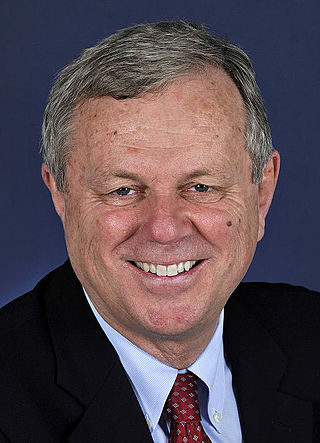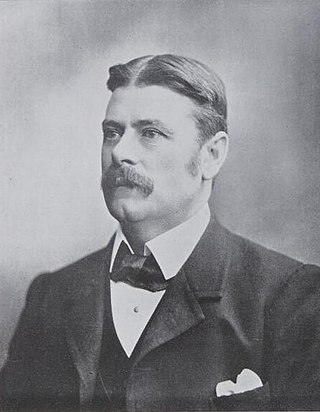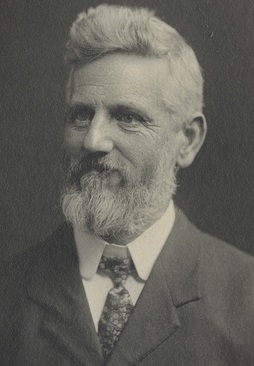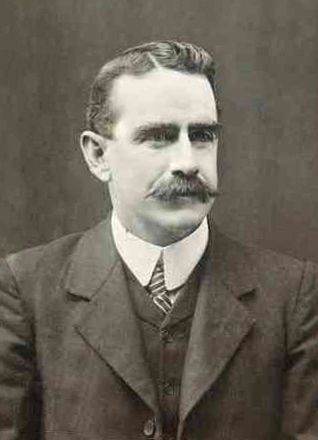Related Research Articles

Egerton Lee Batchelor was an Australian politician and trade unionist. He was a pioneer of the Australian Labor Party (ALP) in South Australia, which at the time was known as the United Labor Party (ULP). He was a member of the South Australian House of Assembly (1893–1901), leading the ULP from 1898 until his resignation in 1899 to accept a ministerial post in a non-Labor government, with the party's approval. Batchelor entered federal politics in 1901 and held cabinet posts in the first three ALP governments. He was Minister for Home Affairs (1904) under Chris Watson, and then served two terms as Minister for External Affairs under Andrew Fisher. He suffered a fatal heart attack at the age of 46 while climbing Mount Donna Buang.

Crawford Vaughan was an Australian politician, and the Premier of South Australia from 1915 to 1917. He was a member of the South Australian House of Assembly from 1905 to 1918, representing Torrens (1905–1915) and Sturt (1915–1918). Elected for the United Labor Party, he served as Treasurer in the Verran government, succeeded Verran as Labor leader in 1913, and was elected Premier after the Labor victory at the 1915 state election.
State elections were held in South Australia on 11 December 1993. All 47 seats in the South Australian House of Assembly were up for election. The incumbent Labor government, led by Premier Lynn Arnold, was defeated by the Liberal Opposition, led by Dean Brown, in a landslide victory. The Liberals won what is still the largest majority government in South Australian history.

State elections were held in South Australia on 30 May 1970. All 47 seats in the South Australian House of Assembly were up for election. The incumbent Liberal and Country League led by Premier of South Australia Steele Hall was defeated by the Australian Labor Party led by Leader of the Opposition Don Dunstan.

The 1968South AustralianState election was held in South Australia on 2 March 1968. All 39 seats in the South Australian House of Assembly were up for election; 38 of the 39 contests were won by candidates from Australia's two major political parties. The incumbent Labor Party South Australia led by Premier of South Australia Don Dunstan and the Liberal and Country League led by Leader of the Opposition Steele Hall) both won 19 seats. The sole independent candidate to win a race, Tom Stott of the Ridley electorate, joined with the LCL's 19 seats to form a coalition government that held a 20 to 19 majority, thus defeating the Dunstan Labor government.

Ernest Alfred Roberts was an Australian politician and soldier who was a Labor member of the South Australian House of Assembly from 1896 to 1902 and 1905 to 1908 and then the Australian House of Representatives from 1908 to 1913. Roberts also served as an officer in South Africa during the Second Boer War, with South Australian colonial forces in 1900 and Commonwealth forces in 1902. From 1904 to 1908 he was the editor of The Herald, a left-wing newspaper published by the United Labor Party (ULP).

The 2010 South Australian state election elected members to the 52nd Parliament of South Australia on 20 March 2010. All seats in the House of Assembly or lower house, whose current members were elected at the 2006 election, and half the seats in the Legislative Council or upper house, last filled at the 2002 election, became vacant.

John Abel McPherson was the first leader of the South Australian United Labor Party from 1892 to 1897. Though he never led a government himself, he helped lay the groundwork which ensured that at the 1905 election, Thomas Price would form the world's first stable Labor government. John Verran led Labor to form the state's first of many majority governments at the 1910 election.

The 1893 South Australian colonial election was held on 15 April 1893 to elect all 54 seats in the South Australian House of Assembly.

The 1896 South Australian colonial election was held on 25 April 1896 to elect all 54 seats in the South Australian House of Assembly. In the seat of Northern Territory, the election was on 2 May. All 54 seats in the South Australian House of Assembly were up for election. The incumbent liberal government led by Premier of South Australia Charles Kingston in an informal coalition with the United Labor Party (ULP) led by John McPherson defeated the conservative opposition. Each district elected multiple members, with voters casting multiple votes.

The 1899 South Australian colonial election was held on 29 April 1899 to elect all 54 seats in the South Australian House of Assembly. In the seat of Albert, the incumbent members were elected unopposed on 12 April, and the election in the seat of Northern Territory was held on 6 May. All 54 seats in the South Australian House of Assembly were up for election. The incumbent liberal government led by Premier of South Australia Charles Kingston in an informal coalition United Labor Party (ULP) led by Lee Batchelor defeated the conservative opposition led by Leader of the Opposition John Downer. Each district elected multiple members, with voters casting multiple votes. Although the conservatives won more seats, the liberal government retained power until later that year, when new conservative leader Vaiben Louis Solomon forced the government to resign, but only held office for one week. The liberals held government until the next election through leaders Frederick Holder and John Jenkins.

The 1902 South Australian state election was held on 3 May 1902 following the dissolution of both houses. All 42 seats in the South Australian House of Assembly were up for election, and all 18 seats in the Legislative Council. The House had a reduction of 12 seats compared to the previous election. The Council was reduced from 6 members in each of four districts to 6 members from Central District and four from each of North-Eastern, Northern and Southern Districts. The incumbent liberal government led by Premier of South Australia John Jenkins in an informal coalition with the conservatives defeated the United Labor Party (ULP) led by Thomas Price. Each of the 13 districts elected multiple members, with voters casting multiple votes.

The 1905 South Australian state election was held on 27 May 1905. All 42 seats in the South Australian House of Assembly were up for election. The incumbent conservative government led by Premier of South Australia Richard Butler in an informal coalition with the liberals was defeated by the United Labor Party (ULP) led by Leader of the Opposition Thomas Price. Each of the 13 districts elected multiple members, with voters casting multiple votes.

The 1906 South Australian state election was held on 3 November 1906 to elect all 42 seats in the South Australian House of Assembly. The seat of Northern Territory went to an election on 10 November.

State elections were held in South Australia on 2 April 1910. All 42 seats in the South Australian House of Assembly were up for election. The incumbent Liberal and Democratic Union (LDU) government led by Premier of South Australia Archibald Peake was defeated by the United Labor Party (ULP) led by John Verran. Each of the 13 districts elected multiple members, with voters casting multiple votes. The Peake LDU minority government had replaced the Price ULP/LDU coalition government in June 1909. The 1910 election was the first to result in a South Australian majority government. This came two weeks after the election of a first majority in either house in the Parliament of Australia at the 1910 federal election, also for Labor. Though a South Australian majority was won, the ULP did not take office until after the new lower house first met.
Wallaroo is a defunct electoral district that elected members to the House of Assembly, the lower house of the bicameral legislature of the Australian state of South Australia. It was established in 1875 and abolished in 1970.
East Adelaide was an electoral district of the South Australian Legislative Council from 1851 to 1857 and an electoral district of the South Australian House of Assembly from 1862 to 1902.

William Joseph Denny was an Australian journalist, lawyer, politician and decorated soldier who held the South Australian House of Assembly seats of West Adelaide from 1900 to 1902 and then Adelaide from 1902 to 1905 and again from 1906 to 1933. After an unsuccessful candidacy as a United Labor Party (ULP) member in 1899, he was elected as an "independent liberal" in a by-election in 1900. He was re-elected in 1902, but defeated in 1905. The following year, he was elected as a ULP candidate, and retained his seat for that party until 1931. Along with the rest of the cabinet, he was ejected from the Australian Labor Party in 1931, and was a member of the Parliamentary Labor Party until his electoral defeat at the hands of a Lang Labor Party candidate in 1933.
A by-election was held for the South Australian House of Assembly seat of Wallaroo on 23 May 1891. This was triggered by the resignation of the former Wallaroo MHA David Bews.

The South Australian Labor Party, officially known as the Australian Labor Party (South Australian Branch) and commonly referred to simply as South Australian Labor, is the South Australian Branch of the Australian Labor Party, originally formed in 1891 as the United Labor Party of South Australia. It is one of two major parties in the bicameral Parliament of South Australia, the other being the Liberal Party of Australia (SA Division).